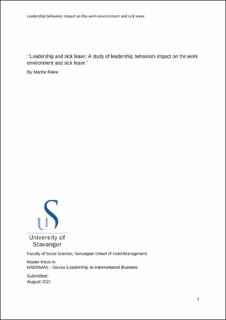“Leadership and sick leave: A study of leadership behaviors impact on the work environment and sick leave”
Master thesis
Permanent lenke
https://hdl.handle.net/11250/2835288Utgivelsesdato
2021Metadata
Vis full innførselSamlinger
- Studentoppgaver (SV-NHS) [561]
Sammendrag
Abstract Background/Purpose: To explore what associations are described, and the impact of, leadership behaviors on sick leave in modern research literature. The importance of a good leadership to prevent sick leave is a promising, under researched, and complicated issue in need of considerably more attention. The reasons behind sick leave are also numerous and diverse. To make it clear, the following explanatory models are used: 1) The Effort-Reward Imbalance model (Siegrist, 1996), 2) The job Demand-Control model (Karasek & Theorell, 1990) and 3) The Demands-Resources model (Demerouti, Bakker, Nachreiner & Schaufeli (2001).
Methodology: The study employed literature reviewing as methodology. After the initial literature search, it was clear that research on the topic of leadership behaviors and sick leave combined, remains fragmented. The author aims to map out these research gaps for future research. Literature reviews play an imperative role as a foundation for all research. They serve as a basis for knowledge development, create new guidelines for policy and practice, and have the capacity to cause new ideas and directions. In a similar vein, this thesis aim is to make an overview of what has been researched to uncover causal connections.
Key Findings: Findings are based on seven literature studies conducted in Northern Europe. The studies examine sick leave and respectively relationship-oriented leadership, health-promoting leadership, the psychosocial work environment, psychosocial and mechanical effects, burnout, and job engagement. Findings supports previous research on the topic and demonstrate the importance of acknowledging associations between the leadership and sick leave. The aim is to contribute to improved performance, well-being, good health, and lower sick leave levels in the future. The most decisive finding claims that carrying the correct leadership behavior and traits, is of great importance for employees’ motivation to work. Especially when demands at work are high.
Research limitations: The time span of the research articles can be considered as a limitation. Leadership behaviors, rules and legislations may have changed, and will continue to change in the future. Behaviors, rules and legislations also differ within each country. Moreover, the authors focus was on one factor (leaders behavior) that affects sick leave. To explain the maximum possible measure of the variability in sick leave, it would be best to include several influencing factors.
Key Words: Leadership behavior, work environment, sick leave, well-being
